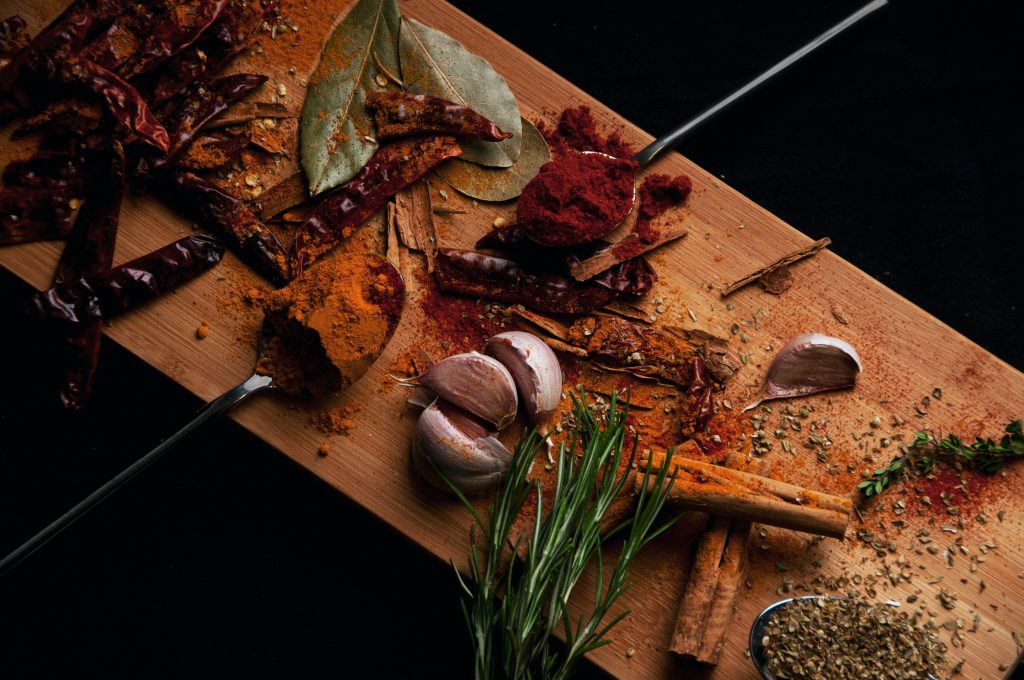
Loaded with nutrients and vitamins, including vitamin B6 and minerals like magnesium and manganese, ginger is immunity-boosting. It is also anti-inflammatory and antibacterial, which makes it a great aid in the fight against infections. In Ayurveda we say it kindles the jathar agni, or digestive fire, thereby supporting our first line of immune defence in the gut. Ginger also contains many phenolic compounds such as gingerol, shogaol and paradol which have antioxidant, anti-tumour and anti-inflammatory properties.
Sip fresh ginger tea daily to kindle agni and help flush toxins from your system.
As my supermarket visit confirmed, we are becoming aware of the wonderful benefits of turmeric. Ayurveda would recommend it in its whole form, rather than the extracted version often offered in supplements. If you can get the fresh root, that’s fantastic – you could also try buying your supply from an organic herbs specialist. This is likely to give you a turmeric powder with more therapeutic value (my own trip to the supermarket was for a temporary emergency supply whilst I waited for my usual turmeric delivery to arrive).
Turmeric is also loaded with antioxidants and has a powerful anti-inflammatory effect. Ayurveda has known this for thousands of years, and more recent scientific studies are confirming it. You can enjoy turmeric in a soothing golden milk drink as well as in ginger tea. My cousin drank golden milk whilst recovering from an infection at home recently, and compared its delicious taste and soothing effect to a turmeric latte. Please don’t forget to add a pinch of warming black pepper, which will also help to activate the therapeutic properties of turmeric.
It is quite pleasant to consume as an infusion. Tulsi is a sacred plant for Hindus and is seen as an avatar of the goddess Lakshmi, the deity of material and spiritual abundance. It grows in the gardens and near the doors of many homes in India, and has long been recognised for its medicinal properties in Ayurveda.
Tulsi is an adaptogenic herb, meaning it can help the body combat the effects of stress – which we know only too well weakens our resistance to infection and disease. Again, it contains antioxidant, anti-inflammatory, and also anti-ageing phenols. It also contains apigenin, a flavonoid that helps to remove waste at a cellular level.
Perhaps most importantly for these times tulsi is one of the most potent antiviral herbs of Ayurveda, and specifically targets the respiratory system to reduce symptoms of cough, cold and bronchitis. It helps to clear the lungs. It is beneficial to Vata and Kapha dosha types, but Pitta types or those with Pitta type symptoms should take it cautiously.
It is slightly heating, so will reduce the properties of Vata and Kapha – but Vata types need to be cautious due to moringa's light, sharp and dry qualities. Taking the powder form with a little ghee may be a good alternative for Vata types: the ghee will antidote the herb's Vata-aggravating qualities. Again, Pitta types should take moringa sparingly due to its heating properties.
Nature has given us so many wonderful healing plants, hasn’t it? And it’s fantastic that they are becoming more widely known and available. However, Ayurveda is clear that nothing beats a balanced lifestyle for our health and wellbeing. Regularity in eating and sleeping routines are essential – regular daily exercise and meditation or relaxation, walking in nature, and eating a wholefood, seasonal diet are all Ayurvedic prescriptions for sustained health in body and mind. This kind of lifestyle will add power to any herbs you might chose to take.
Stress resilience is also crucial for our immunity, yet sometimes overwhelming events happen and life can pull the rug from under our feet. At these times when we need extra help, Ayurvedic herbs have much to offer here too. Please do look out for my article next month, where we'll be looking at Ayurvedic herbs for stressful times.
Stay well and stay strong – with the self-care you deserve.
NOTE: Please always check with your doctor before using any of these substances for therapeutic purpose if you have a medical condition. The herbs are not meant to replace, but add to, professional medical care any time you become ill.

Take a trip into into a world of wisdom

Join the Academy and learn from some of the best spiritual
and wellbeing teachers in the world
Join the Academy and learn from some of the best spiritual
and wellbeing teachers in the world